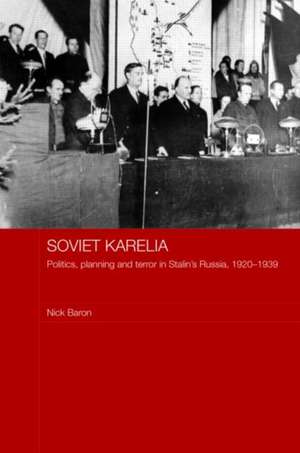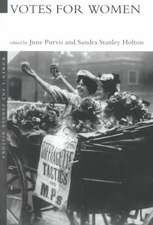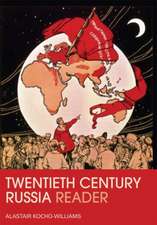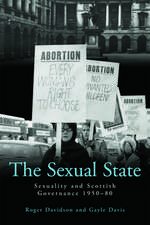Soviet Karelia: Politics, Planning and Terror in Stalin's Russia, 1920–1939: BASEES/Routledge Series on Russian and East European Studies
Autor Nick Baronen Limba Engleză Hardback – 14 dec 2007
| Toate formatele și edițiile | Preț | Express |
|---|---|---|
| Paperback (1) | 417.96 lei 6-8 săpt. | |
| Taylor & Francis – 26 iun 2009 | 417.96 lei 6-8 săpt. | |
| Hardback (1) | 1067.14 lei 6-8 săpt. | |
| Taylor & Francis – 14 dec 2007 | 1067.14 lei 6-8 săpt. |
Din seria BASEES/Routledge Series on Russian and East European Studies
-
 Preț: 228.19 lei
Preț: 228.19 lei -
 Preț: 311.22 lei
Preț: 311.22 lei - 8%
 Preț: 389.15 lei
Preț: 389.15 lei -
 Preț: 737.44 lei
Preț: 737.44 lei -
 Preț: 309.89 lei
Preț: 309.89 lei -
 Preț: 325.30 lei
Preț: 325.30 lei -
 Preț: 297.40 lei
Preț: 297.40 lei -
 Preț: 326.49 lei
Preț: 326.49 lei -
 Preț: 349.10 lei
Preț: 349.10 lei - 9%
 Preț: 1072.83 lei
Preț: 1072.83 lei - 24%
 Preț: 298.10 lei
Preț: 298.10 lei -
 Preț: 398.18 lei
Preț: 398.18 lei - 18%
 Preț: 1271.75 lei
Preț: 1271.75 lei - 18%
 Preț: 1057.05 lei
Preț: 1057.05 lei - 18%
 Preț: 1059.84 lei
Preț: 1059.84 lei - 18%
 Preț: 1062.26 lei
Preț: 1062.26 lei - 18%
 Preț: 1055.51 lei
Preț: 1055.51 lei - 18%
 Preț: 1057.75 lei
Preț: 1057.75 lei - 18%
 Preț: 1059.84 lei
Preț: 1059.84 lei - 28%
 Preț: 823.63 lei
Preț: 823.63 lei -
 Preț: 487.75 lei
Preț: 487.75 lei - 18%
 Preț: 1002.36 lei
Preț: 1002.36 lei - 18%
 Preț: 1000.76 lei
Preț: 1000.76 lei - 8%
 Preț: 382.79 lei
Preț: 382.79 lei - 18%
 Preț: 1059.84 lei
Preț: 1059.84 lei - 18%
 Preț: 1059.84 lei
Preț: 1059.84 lei - 18%
 Preț: 1009.21 lei
Preț: 1009.21 lei - 18%
 Preț: 1059.84 lei
Preț: 1059.84 lei - 18%
 Preț: 1167.36 lei
Preț: 1167.36 lei - 18%
 Preț: 1060.87 lei
Preț: 1060.87 lei - 30%
 Preț: 771.71 lei
Preț: 771.71 lei - 18%
 Preț: 1059.84 lei
Preț: 1059.84 lei - 18%
 Preț: 1004.20 lei
Preț: 1004.20 lei - 18%
 Preț: 1053.92 lei
Preț: 1053.92 lei - 25%
 Preț: 515.72 lei
Preț: 515.72 lei - 18%
 Preț: 709.01 lei
Preț: 709.01 lei - 25%
 Preț: 823.08 lei
Preț: 823.08 lei - 18%
 Preț: 1103.19 lei
Preț: 1103.19 lei - 18%
 Preț: 1057.75 lei
Preț: 1057.75 lei - 18%
 Preț: 1065.75 lei
Preț: 1065.75 lei - 18%
 Preț: 1055.51 lei
Preț: 1055.51 lei - 26%
 Preț: 850.73 lei
Preț: 850.73 lei - 28%
 Preț: 825.06 lei
Preț: 825.06 lei - 18%
 Preț: 734.50 lei
Preț: 734.50 lei - 26%
 Preț: 821.94 lei
Preț: 821.94 lei - 18%
 Preț: 1062.98 lei
Preț: 1062.98 lei - 18%
 Preț: 1002.63 lei
Preț: 1002.63 lei
Preț: 1067.14 lei
Preț vechi: 1301.39 lei
-18% Nou
Puncte Express: 1601
Preț estimativ în valută:
204.22€ • 212.42$ • 168.60£
204.22€ • 212.42$ • 168.60£
Carte tipărită la comandă
Livrare economică 14-28 aprilie
Preluare comenzi: 021 569.72.76
Specificații
ISBN-13: 9780415312165
ISBN-10: 0415312167
Pagini: 352
Ilustrații: 27 b/w images, 27 tables, 16 halftones and 11 line drawings
Dimensiuni: 156 x 234 x 21 mm
Greutate: 0.81 kg
Ediția:1
Editura: Taylor & Francis
Colecția Routledge
Seria BASEES/Routledge Series on Russian and East European Studies
Locul publicării:Oxford, United Kingdom
ISBN-10: 0415312167
Pagini: 352
Ilustrații: 27 b/w images, 27 tables, 16 halftones and 11 line drawings
Dimensiuni: 156 x 234 x 21 mm
Greutate: 0.81 kg
Ediția:1
Editura: Taylor & Francis
Colecția Routledge
Seria BASEES/Routledge Series on Russian and East European Studies
Locul publicării:Oxford, United Kingdom
Public țintă
Postgraduate and ProfessionalCuprins
Introduction 1. ‘A Dark, Backward and Oppressed Periphery’: Histories of Karelian Space 2. ‘A Scandinavian Revolutionary Centre’: Borders, Boundaries and Spatial Ambitions, 1920–1928 3. The Limits of Autonomy: Finance, Planning and Population, 1920–1928 4. ‘A Question of Survival’: Centralisation and Control of Regional Space, 1928–1932 5. ‘The Urals-Kuznetsk Combine on a Smaller Scale’: Visions and Realities of Peripheral Development, 1933–1937 6. ‘The Republican NKVD Has Slaughtered All our Cadres’: Terror on the Periphery, 1935–1939. Conclusion
Notă biografică
Nick Baron teaches twentieth century Russian and East European history and historical geography at the University of Nottingham, UK. He is the author of The King of Karelia. Col P.J. Woods and the British Intervention in North Russia, 1918-1919 (2007) and co-editor of Homelands. War, Population and Statehood in Eastern Europe and Russia, 1918-1924 (2004) and Sovetskaia Lesnaia Ekonomika. Moskva-Sever. 1917-1941 (2005). He is currently working on a cultural history of Soviet cartography.
Recenzii
'Baron is majestic in detailing the tortuous paths to this Stalinist outcome...It deserves to be widely read' - Revolutionary Russia
'...a major contribution to the burgeoning scholarly literature on 'centre-periphery' relations...majestic in detailing the tortuous paths to this Stalinist outcome... a significant contribution to the history of interwar Soviet Russia. It deserves to be widely read.'- Kevin McDermott, Sheffield Hallam University; Revolutionary Russia, 21:1 (2008), 101-03
"...this is an impressive work of scholarship based on an astonishing array of archival and published sources, and is recommended reading for specialists in the field."
- K.C. O'Connor, Gonzaga University; Choice
"Nick Baron's excellent Soviet Karelia ...Provides .... an insightful portrait of the Stalinist regime that, while unflinching in its treatment of the system's dictatorial tendencies, sidesteps the timeworn "totalitarian-revisionist" dichotomy in favor of something more innovative .... The book is conceptually sophisticated without being opaque or jargon-ridden, and it benefits from effective cross-fertilization with the field of geography." - John McCannon, University of Saskatchewan, Canada, Slavic Review, Spring 2008
"This superb analysis of the relationship between Moscow and the frontier in the 1920s and 1930s refracts politics and economics through geography, benefiting from the author’s prodigious archival research and knowledge of the admirable secondary literature in Russian and Finnish of the last twenty years [...] The book is a must for anyone concerned with the role of interests in shaping Soviet politics, the processes by which economic and political life came under ever tighter control by the Stalinist leadership, how interests continued nevertheless to find reflection in Soviet politics, and the ways in which local peculiarities similarly continued to affect the experience of space within the Soviet realm." - Michael Gelb, The Russian Review, Volume 68, Issue 1 (p 163-64)
"...Baron's book is an important contribution to the field. It analyzes in detail political relations and controversies over the economy between Moscow and the regional leadership. The book is based on recently declassified party, state, and security police documents; its empirical base is exceptionally solid...Baron's book is a major contribution to the scholarly literature on Soviet Karelia and on center-periphery relations in the Soviet empire. In short, it is an impressive masterpiece in its own field." - Sune Jungar, Abo Akademi University, American Historical Review, June 2009
'...a major contribution to the burgeoning scholarly literature on 'centre-periphery' relations...majestic in detailing the tortuous paths to this Stalinist outcome... a significant contribution to the history of interwar Soviet Russia. It deserves to be widely read.'- Kevin McDermott, Sheffield Hallam University; Revolutionary Russia, 21:1 (2008), 101-03
"...this is an impressive work of scholarship based on an astonishing array of archival and published sources, and is recommended reading for specialists in the field."
- K.C. O'Connor, Gonzaga University; Choice
"Nick Baron's excellent Soviet Karelia ...Provides .... an insightful portrait of the Stalinist regime that, while unflinching in its treatment of the system's dictatorial tendencies, sidesteps the timeworn "totalitarian-revisionist" dichotomy in favor of something more innovative .... The book is conceptually sophisticated without being opaque or jargon-ridden, and it benefits from effective cross-fertilization with the field of geography." - John McCannon, University of Saskatchewan, Canada, Slavic Review, Spring 2008
"This superb analysis of the relationship between Moscow and the frontier in the 1920s and 1930s refracts politics and economics through geography, benefiting from the author’s prodigious archival research and knowledge of the admirable secondary literature in Russian and Finnish of the last twenty years [...] The book is a must for anyone concerned with the role of interests in shaping Soviet politics, the processes by which economic and political life came under ever tighter control by the Stalinist leadership, how interests continued nevertheless to find reflection in Soviet politics, and the ways in which local peculiarities similarly continued to affect the experience of space within the Soviet realm." - Michael Gelb, The Russian Review, Volume 68, Issue 1 (p 163-64)
"...Baron's book is an important contribution to the field. It analyzes in detail political relations and controversies over the economy between Moscow and the regional leadership. The book is based on recently declassified party, state, and security police documents; its empirical base is exceptionally solid...Baron's book is a major contribution to the scholarly literature on Soviet Karelia and on center-periphery relations in the Soviet empire. In short, it is an impressive masterpiece in its own field." - Sune Jungar, Abo Akademi University, American Historical Review, June 2009
Descriere
This work traces the evolution of Soviet Karelia in the early Soviet period, discussing amongst other things how relationships between the local communist leadership and Moscow changed over time, and how massive repression of the Karelian population was eventually imposed.


























